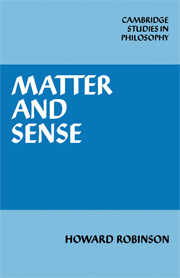Book contents
- Frontmatter
- Contents
- Acknowledgments
- 1 The materialist's problem and some non-reductive solutions
- 2 Supervenience and reduction
- 3 Behaviourism and stimulus materialism
- 4 The causal theory of mind
- 5 The disappearance theory
- 6 Reductive theories of perception
- 7 Matter: turning the tables
- Conclusion
- References
- Index
2 - Supervenience and reduction
Published online by Cambridge University Press: 07 May 2010
- Frontmatter
- Contents
- Acknowledgments
- 1 The materialist's problem and some non-reductive solutions
- 2 Supervenience and reduction
- 3 Behaviourism and stimulus materialism
- 4 The causal theory of mind
- 5 The disappearance theory
- 6 Reductive theories of perception
- 7 Matter: turning the tables
- Conclusion
- References
- Index
Summary
SUPERVENIENCE AND NECESSITY: THE OPTIONS
The concept of reduction has always played an important part in the discussion of materialist theories. To some extent it is a ‘boo’ word, signifying that the materialist is adopting a counterintuitive position – one which involves claiming that mind is other than it seems. For this reason the philosophers we have been discussing so far deny that they are reductionists. They say that the mental is not reducible to the physical, although it supervenes upon it. The purpose of this chapter is to investigate the fashionable concept of supervenience and to see how, if at all, it differs from reduction.
It is convenient to start this investigation by picking up an unfinished line of argument from our discussion of interaction and epiphenomenalism (see ch. 1.3). One criterion of whether an event or state is epiphenomenal and does not interact with other things is whether its absence would have had causal consequences, ceterisparibus. We showed that mental events were epiphenomenal on Davidson's and Peacocke's theory without recourse to this criterion: we showed that a interacts with b to produce c only if a causally explains c, whereas on their theory the occurrence of mental states causally explains nothing. However, reversion to the former criterion is a good place to begin a discussion of supervenience. It serves this purpose because the question ‘What would have happened if mental states had been absent and other things had remained the same?’ will only have application if it makes sense to suggest that mental states might have been absent while physical states remained the same.
- Type
- Chapter
- Information
- Matter and SenseA Critique of Contemporary Materialism, pp. 20 - 34Publisher: Cambridge University PressPrint publication year: 1982



